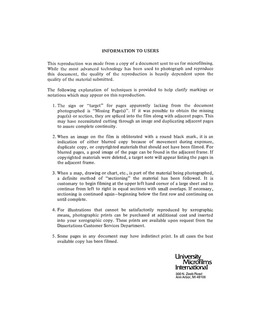| dc.contributor.author | Ralph, David Alan, | en_US |
| dc.date.accessioned | 2013-08-16T12:29:17Z | |
| dc.date.available | 2013-08-16T12:29:17Z | |
| dc.date.issued | 1984 | en_US |
| dc.identifier.uri | https://hdl.handle.net/11244/5291 | |
| dc.description.abstract | Through greater understanding of professional satisfaction, the application of this study has significance in improving the opportunities for satisfaction in pharmacy practice and as a source of direction for change in pharmaceutical undergraduate and continuing education. | en_US |
| dc.description.abstract | This study examined registered pharmacists licensed and residing in the state of Oklahoma. From the population of 2,957 pharmacists, a sample of 300 was randomly selected for the study. Satisfaction of the 157 (53.0%) pharmacists who responded to the mail-out questionnaire was measured by an index of job satisfaction, an index of professional satisfaction, and a satisfaction inventory of 17 facets considered to characterize pharmacy as a profession. From the questionnaire respondents, a 12% sample of pharmacists demonstrating extreme professional satisfaction and dissatisfaction were selected for telephone interviews. The reliability of the mail-out survey instrument utilized was determined by the split-half test and Spearman-Brown step-up procedure to be 0.95. | en_US |
| dc.description.abstract | Studies have indicated there is a significant level of pharmacist professional dissatisfaction. While various concepts have been presented as possible explanations of pharmacist satisfaction or dissatisfaction, verification of these theories has not been thoroughly pursued. The problem which this study examined was whether the theoretical constructs of role conflict, incomplete professionalization, Herzberg's (1966) satisfier/dissatisfier theory, or professional satisfaction as a function of length of practice or practitioner age, serve as valid explanations of pharmacists' professional satisfaction or dissatisfaction. | en_US |
| dc.description.abstract | Through the data collected from the mail-out questionnaire and follow-up telephone interviews, the four concepts being studied may indeed serve as possible explanations of pharmacists' professional satisfaction/dissatisfaction but in modified forms. This study found that pharmacists' professional satisfaction is significantly less than satisfaction with their job. This study also found that pharmacists' dissatisfaction is principally the result of a deperate search for professional identity (modification of role conflict and incomplete professionalization concepts), and the trauma of the mid-life crisis period of the adult life-cycle (indicated by both age and years of experience measurements). In addition, the study identified several facets of the profession which are professional satisfiers. (Herzberg, 1966) However, the study was unable to identify specific hygiene (dissatisfier) facets of the profession. | en_US |
| dc.format.extent | xi, 126 leaves : | en_US |
| dc.subject | Health Sciences, Pharmacy. | en_US |
| dc.title | A study of pharmacists and explanations of professional satisfaction and dissatisfaction / | en_US |
| dc.type | Thesis | en_US |
| dc.thesis.degree | Ph.D. | en_US |
| dc.thesis.degreeDiscipline | Jeannine Rainbolt College of Education | en_US |
| dc.note | Source: Dissertation Abstracts International, Volume: 45-08, Section: B, page: 2517. | en_US |
| ou.identifier | (UMI)AAI8425544 | en_US |
| ou.group | Jeannine Rainbolt College of Education | |
